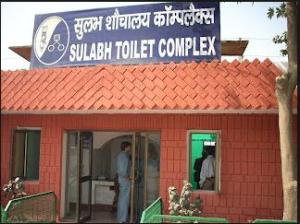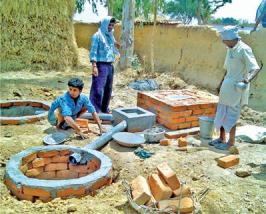India’s Economic Times reports that the new NDA government under Narendra Modi is said to be setting up a multi-million dollar sanitation project in around 1,000 Indian towns as a tribute to Mahatma Gandhi whose 150th birth anniversary will be celebrated in 2019.
 We have noted the work of Sulabh International which to date has constructed and is maintaining over 8000 public toilets in India.
We have noted the work of Sulabh International which to date has constructed and is maintaining over 8000 public toilets in India.
It has constructed 200 biogas plants all over the country, developing the production of biogas from public toilets and recycling of effluent.
Bindeshwar Pathak, founder of the non-governmental organisation, decided to write to Prime Minister Narendra Modi.
Referring to Mr. Modi’s slogan “Toilet first, temple later,” he said, “Building a toilet at every household will herald an effective social change in society … I will urge the Prime Minister to make it his government’s top priority.”
 An environmental friendly two-pit, pour-flush compost toilet known as Sulabh Shauchalaya is socially acceptable, economically affordable, technologically appropriate, does not require scavengers to clean the pits and has been installed in more than 1.2 million houses all over India.
An environmental friendly two-pit, pour-flush compost toilet known as Sulabh Shauchalaya is socially acceptable, economically affordable, technologically appropriate, does not require scavengers to clean the pits and has been installed in more than 1.2 million houses all over India.
The system has been used for many years in rural America – see the work of Joseph Jenkins. After describing the method in detail in his influential book, Humanure, he warns:
“Someone needs to keep an eye on the toilet chambers to make sure they’re receiving enough bulking material. The deposits need to be flattened regularly so that they remain covered and odorless. Chutes that channel humanure from the toilet seat to the compost chamber must be cleaned regularly in order to prevent odors.
 When one compost chamber is filled, it must be rested while the other is filled. A close eye on the toilet contents will prevent waterlogging. Any leachate system must be monitored. In short, any composting toilet will require some management.
When one compost chamber is filled, it must be rested while the other is filled. A close eye on the toilet contents will prevent waterlogging. Any leachate system must be monitored. In short, any composting toilet will require some management.
“Remember that you are actively recycling organic material and that means you are doing something constructive. When you consider the value of the finished compost, you can also realize that every time you deposit into a composting toilet, it’s as if you’re putting money in the bank.
“Homemade low-temperature composting toilets offer a method of composting humanure that is attractive to persons wanting a low-maintenance, low-cost, fairly passive approach to excrement recycling.
“Any effort which constructively returns organic refuse to the soil without polluting water or the environment certainly demands a high level of commendation”.